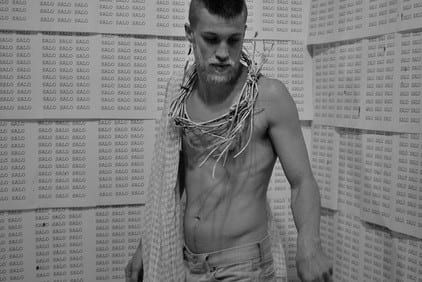Artist Chasen Iglehart, a student at Western Kentucky University, has gained numerous awards and accolades for his socially-conscious art pieces. In the past few years, his work has taken him to many parts of France, Thailand, and Turkey. He exhibits regularly in the United States and abroad.
Iglehart, who has developed a series of paintings concerning HIV and desires to use his platform to publicize social issues, explains that his art is an extension of his daily life in this interview with Out & About Newspaper.
I understand you're doing an internship with the Frist this summer. What does that involve and how has your experience been so far?
My Frist internship is for the summer art camp; I am an assistant teacher there. It mainly involves helping the professor better explain the processes they are trying to teach. Our age group is 5 - 10 years old so a lot of what I do is help them understand the directions and materials they are working with, along with discipline and keeping order within the classroom.
You've done a series of paintings concerning HIV. What motivated you to tackle that subject in your art?
The HIV series I created in 2010 is based on my own sero-conversion early that year. I found out I was HIV-positive and left for Istanbul two days later for school. It was a very intense time being both confused about the virus and coming to grips with it, while being in a place that didn't accept me and where I was seen only as an outsider. The dichotomy I felt between my invasion into a culture and that invasion that was taking place inside my body. I felt the virus gave me insight, a vision that only I could see. I used this prophetic relationship with the disease as a vessel for art making, I had to make the virus tactile and see it as symbols to fully understand what it was that was happening to me. Only after objectifying HIV and coming to grasps with it did it finally lose power over me.
What are the core messages and themes that you want to display in your art?
My core messages are still being understood. I try not to staple words or final thoughts to my process. It's very organic, making and making to try and find something that sticks out to me, that's my success. The message lies in my Statement, mainly that there are no truths, no absolutes in life. The only thing we can do is process and be aware, or in my case slash, or brush, or paint to try and get closer to that unknowable thing.
Why is painting so important to you and where do you see your career going from here?
Painting is not all I do. I have been active in performance work as well as installations with my new series Salo. It all comes from the same source, painting, performance sculptures, they all come from that questioning and awareness to the truth in reality. Art making of any kind is motion. I need that motion to feel any kind of fulfillment in life, through paint I understand the history of a disease; through images I feel the weight of violence and war, through the dialectic process of substance to surface interplay I create my own answers. That means everything to me.
As for my future career, I have many ideas and opportunities ahead. The most practical thing would be going to get my MFA from a big art school and hopefully scoring a professor job at an university. My work tends to deal with more academic ideas and credits, so staying within a system that allows me to be intellectually stimulated while working would seem best fit. As for now, I am trying to show locally and keep pumping out the artwork, while furthering my own content and internal dialogue.
